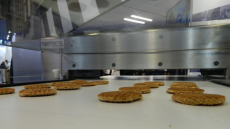UK confectionery sector cuts Easter egg packaging by as much as 90 per cent
In response to growing consumer pressure, a swathe of confectionery firms, including Cadbury UK and Mars UK, have announced significant reductions in packaging to tackle the 3,000 tonnes of Easter egg packaging produced in the UK each year.
A recent consumer poll from the Advisory Committee on Packaging found some 59 per cent of UK adults believed Easter eggs are over-packaged.
“With seasonal confectionery receiving criticism for excessive packaging over recent years, I’m delighted to see the sector responding so positively and collectively,” said Mark Barthel, special advisor for WRAP.
"They are also gaining the cost benefits of materials savings and improvements in distribution efficiency,” he added.
But reducing packaging sets up challenges for the chocolate makers in terms of product protection and presentation. Easter eggs are typically hollow and fragile, and in order to ensure that the eggs arrive on the shelf in one piece, they need to have a form of protection during the distribution chain.
Further, Easter eggs are generally gifts, with the packaging representing an integral element of the gift presentation.
However, as part of an agreement under the WRAP-led 'seasonal confectionery industry working group', major suppliers such as Cadbury UK, Kraft UK, Magna Specialist Confectioners, and Nestlé UK made a collective and voluntary agreement to make significant reductions to their Easter egg packaging for 2009.
Cadbury UK delivers 25 per cent reduction
Cadbury UK has seen a 25 per cent reduction in packaging across medium shell eggs resulting in 220 tonnes less plastic, 250 tonnes less carton board and an additional 90 tonnes less transit and display packaging.
The UK chocolate firm has also made "significant saving" on its large shell egg range where it diminished packaging by 36 per cent, reducing plastic by 108 tonnes, cartonboard by 65 tonnes and corrugated cardboard by 44 tonnes. Cadbury UK is also building on the 2008 launch of its unboxed range, Eco eggs.
M&S sees 30 and 90 per cent slash
UK retailer Marks & Spencer has reduced its Easter egg packaging by nearly 30 per cent, and today uses "its highest ever percentage of recycled materials". The ‘Max the Bunny’ egg saw a 90 per cent reduction in packaging by replacing the plastic drum packaging with a light weight printed plastic film.
According to the retailer, over 85 per cent of packaging across the M&S Easter range is recyclable and 68 per cent of all plastic used contains recycled materials, reducing the need to use virgin oil plastic.
Mars achieves 42 per cent reduction
Mars has cut cardboard weight by 42 per cent and reduced the amount of plastic used. All remaining Easter egg packaging is now 100 per cent recycled cardboard and carries advice to consumers on how and where to dispose of the packaging.
Nestlé UK slashes plastic by 80 per cent
Confectionery giant Nestle has removed plastic packaging from around 80 per cent of its shell Easter eggs in a move to further its green credentials.
The Swiss firm said the decision to swap from plastic casing around Easter eggs to cardboard will save hundreds of tonnes of waste and result in a 30 per cent reduction in the weight of packaging for the affected products.
“Changes to our Easter eggs have resulted in over 700 tonnes less waste being sent to landfill and has also benefited retailers as packaging reductions will maximise distribution efficiency and in-store shelf utilisation," said Ralf Fiala, head of packaging at Nestle UK.
Nestle, along with other UK food firms that includes Cadbury, Coca Cola and Kellogg's, is also a signatory to the Waste & Resources Action Programme's (WRAP) Courtauld Commitment, a best-practice initiative that seeks to slash waste in both packaging and food.





